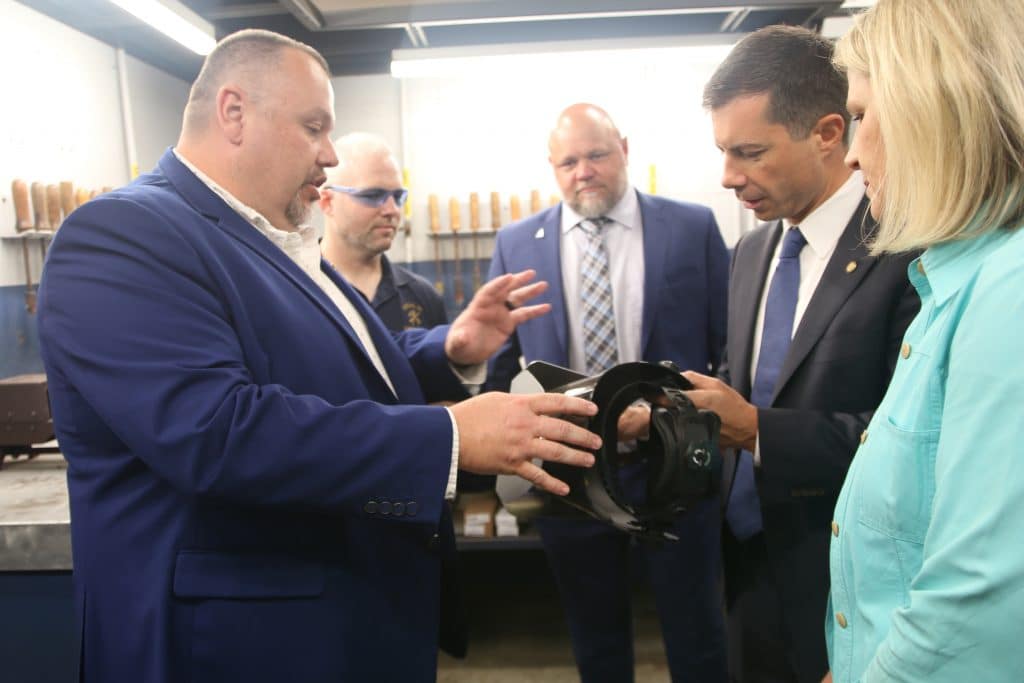By Local 20 Organizer Bradly Hayes
With organizing efforts in Indiana still at an all-time high, Local 20 recently participated in our first-ever organizing blitz to staff the Stellantis battery plant megaproject in Kokomo, Indiana. Thanks to the participation of Local 20 staff and the help of our Youth-to-Youth program, we were able to reach more than 500 jobsites, vocational schools, non-signatory shops and recruitment centers, ranging from Greenwood all the way to South Bend. We also handed out thousands of QR-code cards that linked to wage and benefit information for both non-signatory workers and the general public.
The blitz enabled us to boost membership as well as build our person-of-interest list in anticipation of other megaprojects coming to the state. Not only does this organizing benefit us as a whole; it also offers a life-changing opportunity for many people who are working nonunion.
I reached out to a few members who were organized this year to see what difference they experienced and their overall thoughts on joining the trade. Here is testimony from Xia Walker, who we organized into the apprenticeship program from Peterman Brothers:

“When it comes to my home life and work schedule compared to the big, nonunion HVAC company I was working for, I would have to say it is a night and day difference. The company I worked for did offer competitive pay, but that did not make up for the fact that I was paying almost $900 a month out of my wages just so my family could have insurance. I was also expected to work every day until the job was completed, which could range anywhere from six to 16 hours with no real time to rest in between or daily overtime to make it worth the headache.
“I hated it. I had no free time to spend with family and friends. I have five uncles in the trade who were consistently trying to recruit me so I could spend more time with family and friends and have better pay and benefits. I did enjoy some aspects of residential work, but commercial work is where it’s at. No more disgusting crawl spaces or small attics.
“Overall, I love my consistent work schedule. I can actually be home to spend time with my wife and kids throughout the work week. When I look back at it, I wish I would have stuck with the union back when I was 20; I would definitely be much further in my career than I am today.”
Next up: testimony from Clifton Beezley, who was recently organized from a nonunion fabrication shop and placed with one of Local 20’s contractors:
“The old job I came from did not have any professional mindset or desire to help me grow as an employee; they refused to share their knowledge with me so I could improve myself and expand my abilities in the trade. Since starting with Local 20, I have worked with a great group of knowledgeable workers who are more than willing to share their years of trade knowledge with me and want me to learn the trade and carry that same knowledge. The more I work with them, I see myself growing and gaining professional knowledge that I will eventually pass down to new members one day.

“The shop I was previously working for made me feel very underappreciated and unimportant, and it feels good to work somewhere that makes me feel appreciated and important again. As far as the benefits go, between my old job and now, it doesn’t compare. My entire family has healthcare coverage as an employee paid benefit, and I love it! The last job offered benefits, but the price made them basically unattainable. This has been a huge stress reliever for me and my family, and we couldn’t be happier. This new job has truly offered me life-changing opportunities.”
It is always nice to see how much our organizing can affect someone’s life for the better. Hopefully, reading these testimonies will help us all remember how important it is for us to continue to bring new and experienced members into the trade and make sure they are treated with respect. Clifton shared his experience with Local 20 with others in the shop he came from, as well as family and friends, which has resulted in more than 10 people joining the trade.
This is a prime example of why we always treat every member with solidarity and respect: We are going to need every bit of help we can get in the future, and the need for people is increasing every day.

 The Indiana Department of Transportation (INDOT) and local communities this weekend reached long-term agreements with Amtrak and Iowa Pacific Holdings to continue Hoosier State passenger-rail service between Indianapolis and Chicago.
The Indiana Department of Transportation (INDOT) and local communities this weekend reached long-term agreements with Amtrak and Iowa Pacific Holdings to continue Hoosier State passenger-rail service between Indianapolis and Chicago.

 INDIANAPOLIS – Gov. Mitch Daniels has signed into law right-to-work (for less) legislation in Indiana that prohibits union-shop agreements and prohibits union contracts that require those who decline to join a union from paying any fees for representation – essentially encouraging free riders and severely damaging the financial ability of unions to serve members.
INDIANAPOLIS – Gov. Mitch Daniels has signed into law right-to-work (for less) legislation in Indiana that prohibits union-shop agreements and prohibits union contracts that require those who decline to join a union from paying any fees for representation – essentially encouraging free riders and severely damaging the financial ability of unions to serve members.